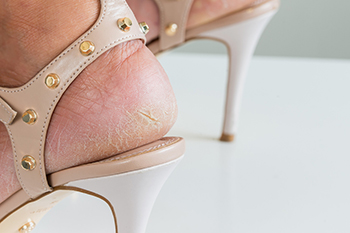
Cracked heels can often be more than just a cosmetic issue. They may signal an underlying health condition, such as a thyroid disorder. The thyroid gland plays a vital role in regulating metabolism, and its imbalance can impact skin health. Hypothyroidism, or an underactive thyroid gland, can lead to dry, thickened skin, which may appear as cracked heels. The reduced hormone levels affects the skin's ability to retain moisture, causing it to become rough and prone to fissures. Individuals with thyroid disorders might notice other symptoms like fatigue, weight gain, or hair loss as well as cracked heels. Maintaining good foot care, such as regular moisturizing and gentle exfoliation, is essential in managing and preventing cracked heels in those with thyroid issues. If you have cracked heels that are causing you pain and discomfort, it is suggested that you consult a podiatrist who can offer you effective relief remedies.
Cracked heels are unsightly and can cause further damage to your shoes and feet. If you have any concerns, contact Scott Matthews, DPM, MD from Salem Foot Care . Our doctor can provide the care you need to keep you pain-free and on your feet.
Cracked Heels
Cracked heels appear unappealing and can make it harder for you walk around in sandals. Aside from looking unpleasant, cracked heels can also tear stockings, socks, and wear out your shoes. There are several methods to help restore a cracked heel and prevent further damage.
How Do You Get Them?
Dry skin is the number one culprit in creating cracked heels. Many athletes, walkers, joggers, and even swimmers suffer from cracked heels. Age and skin oil production play a role to getting cracked heels as well.
Promote Healing
Over the counter medicines can help, especially for those that need instant relief or who suffer from chronic dry feet.
Wear Socks – Wearing socks with medicated creams helps lock in moisture.
Moisturizers – Applying both day and night will help alleviate dryness which causes cracking.
Pumice Stones – These exfoliate and remove dead skin, which allows for smoother moisturizer application and better absorption into the skin.
Change in Diet
Eating healthy with a well-balanced diet will give the skin a fresh and radiant look. Your body responds to the kinds of food you ingest. Omega-3 fatty acids and zinc supplements can also revitalize skin tissue.
Most importantly, seek professional help if unsure how to proceed in treating cracked heels. A podiatrist will help you with any questions or information needed.
If you have any questions, please feel free to contact our office located in Wikesboro, NC . We offer the newest diagnostic and treatment technologies for all your foot care needs.
